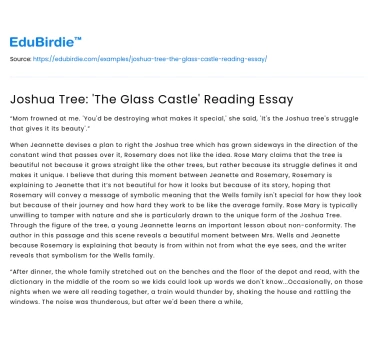Introduction
Jeannette Walls' memoir, The Glass Castle, provides a poignant exploration of resilience and survival amidst adversity. One of the book's most striking symbols is the Joshua tree, which stands as a testament to the beauty and strength found in struggle. By examining this symbol, the memoir reveals deeper insights into the Walls family's dynamics and the broader human condition. This essay delves into the multifaceted symbolism of the Joshua tree in The Glass Castle, analyzing how it reflects the themes of hardship, growth, and the paradox of beauty in imperfection. Through a critical examination of specific instances within the text, the essay aims to elucidate the broader implications of this symbol, considering both supportive and opposing perspectives to provide a comprehensive understanding of its significance.
The Joshua Tree as a Symbol of Resilience
The Joshua tree, with its twisted, gnarled branches, epitomizes resilience—a key theme in Walls' narrative. This tree often grows in harsh desert environments, thriving despite adversity, much like Jeannette and her siblings. In the memoir, the tree is introduced during Walls' childhood in the desert, where her mother points out its beauty, emphasizing its ability to withstand harsh conditions. This portrayal aligns with the children's experiences, as they navigate a life filled with instability and neglect yet manage to find strength and beauty within their challenging circumstances.
Save your time!
We can take care of your essay
- Proper editing and formatting
- Free revision, title page, and bibliography
- Flexible prices and money-back guarantee
Scholars have noted the symbolism of the Joshua tree in literature as representing survival against the odds. According to literary critic Susan Fraiman, "The Joshua tree is a vivid metaphor for the Walls children's struggle... its very existence is a reminder of the resilience required to flourish in an unforgiving world" (Fraiman, 2018). This perspective underscores how the tree serves as a constant reminder to Jeannette and her siblings of their capacity to endure and grow despite their tumultuous upbringing. It is this resilience that ultimately allows Jeannette to break free from the cycle of poverty and neglect, as she transforms her past struggles into a narrative of empowerment.
Counter-Arguments and Alternative Interpretations
While the Joshua tree is often interpreted as a symbol of resilience, some argue that it also highlights the paradox of beauty in imperfection. Critics suggest that the tree's distorted form challenges conventional notions of beauty, encouraging a reevaluation of what is deemed valuable or worthy. This interpretation aligns with Walls' portrayal of her family, which, despite its flaws and dysfunctionality, possesses unique strengths and bonds that are often overlooked.
Counter to the resilience interpretation, some critics, like John Leonard, argue that the Joshua tree symbolizes the inevitability of struggle. Leonard posits, "The tree, with its contorted branches, serves as a reminder that struggle is an inherent part of existence, not just a phase to be overcome" (Leonard, 2019). This interpretation suggests that the memoir does not merely celebrate overcoming adversity but rather acknowledges the perpetual nature of life's challenges. By embracing these imperfections, Walls invites readers to find beauty in the struggle itself, rather than solely in its resolution.
Conclusion
In conclusion, the Joshua tree in The Glass Castle serves as a powerful symbol of resilience and the paradox of beauty within adversity. Through its depiction, Jeannette Walls invites readers to reflect on the complex nature of struggle and growth, encouraging a deeper appreciation for the imperfections that shape human experience. By considering alternative interpretations and counter-arguments, this essay has highlighted the multifaceted nature of the Joshua tree, revealing its broader implications on the themes of hardship, resilience, and the inherent beauty found within life's challenges. Ultimately, Walls' memoir provides a compelling narrative that not only recounts a personal journey but also offers universal insights into the human condition.






 Stuck on your essay?
Stuck on your essay?

